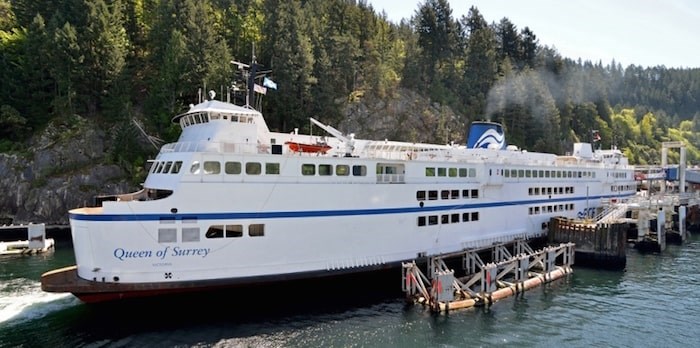Transportation Minister Claire Trevena says the province will increase sailings on 10 BC Ferries routes that saw cuts in 2014, and set up a new “independent advisory council” as part of the government’s response to a new review of ferry service.
Blair Redlin’s review, “Connecting Coastal Communities,” was released Feb. 22.
 Coast Reporter file photo
Coast Reporter file photo
“The Redlin report was very comprehensive with more than 60 recommendations directed to all parties working under the unique and complex coastal ferry governance model,” Trevena said. “One of his recommendations is to establish a long-term vision for ferries and to connect coastal communities in a more integrated manner. This is something my staff and I will be focused on.”
Trevena said the province will soon introduce amendments to the Coastal Ferry Act to implement some of Redlin’s recommendations.
In a conference call with media after the report’s release, Trevena said the sailings being added to routes such as Earls Cove-Saltery Bay and Powell River-Texada Island “will be the ones that the Ferry Advisory Committees asked for on these routes,” and that she expected the first of the new sailings to begin in the spring.
“Permanently reinstating sailings that were cut by the previous government will help ensure families, small business owners, and seniors have easier access travelling along two popular BC Ferries routes,” said Powell River-Sunshine Coast MLA Nicholas Simons, who added Friday’s announcement was “ample reason to celebrate.”
The province is not adding any sailings to the Langdale-Horseshoe Bay route, but Redlin did make some suggestions around making sure changes to the reservation system meet the needs of the Sunshine Coast’s commuter travellers and people using the Transportation Assistance Program (TAP) for medical travel.
“This will be one of the recommendations that I’m anticipating BC Ferries will deal with,” Trevena said. “I think they will be taking this advice when they move ahead with their reservation system.”
Redlin also called on the province to develop a “provincial vision and policy framework for coastal transportation” that should “have a broad scope and should examine big ideas for change, such as a new terminal on Iona Island near Sea Island or passenger only service between the Sunshine Coast and downtown Vancouver.”
The Town of Gibsons has already commissioned a feasibility study on a passenger-only service through the Sunshine Coast Regional Economic Development Agency and taken the idea of provincial subsidies for the service to Trevena. Trevena said Friday that exploring passenger service is an example of “what could come out of a really good visioning process,” but couldn’t give any timeline.
Trevena was also non-committal on provincial subsidies for a privately run passenger service, when the question came up in connection with a service already in the works to link Nanaimo and Vancouver.
Another immediate response to the Redlin report will be the establishment of an advisory council on ferries. Trevena said the advisory council would not replace the Ferry Advisory Committees.
“The council is looking at broader concerns for the whole of the Island and Sunshine Coast, those areas. We’re looking at how we can ensure chambers of commerce, industry, municipalities – the bigger bodies that at present don’t have a voice – can have a voice in the discussion about how we should be evolving our marine highway,” Trevena said.
Redlin noted the ongoing situation with overloads on the Langdale-Horsehoe Bay route and others and that “the current BC Ferries fleet is insufficiently resilient. BC Ferries needs more spare vessel capacity” and recommended the ferry company follow the advice of “a number of Ferry Advisory Committees” and “give serious consideration to commencing the peak season at the Easter long weekend and ending it at the Thanksgiving long weekend.”
Redlin also recommended the province make negotiating an increase to the $30-million federal government annual grant for ferry service “one of its intergovernmental priorities.”
Trevena said she’s in “continued conversations” with her federal counterpart, Minister of Transport Marc Garneau. “He knows this is a priority for us,” she said.
Trevena said from the outset that Redlin was not going to be asked to look at the issue of making BC Ferries a Crown corporation again or returning it to the control of the ministry of transportation. She said the government’s focus is on “how to make BC Ferries more accountable.”
Adam Olsen, Green transportation critic and MLA for Saanich North and the Islands, said he thinks the only way to ensure accountability is through Crown corporation status.
“Since BC Ferries is a private corporation, it is not required to implement these changes,” he said in response to the Redlin report. “My colleagues and I find this deeply concerning and continue to reiterate that BC Ferries would be able to best serve the public interest if it were brought back into government as a Crown corporation.”
BC Ferries president Mark Collins issued a statement saying the ferry company is pleased that the review found it was “on the whole a well-run company.”
“We are currently in the process of reviewing the document thoroughly. We look forward to meeting with the Province to better understand which recommendations they are interested in exploring further,” Collins said.
Redlin’s report was commissioned in late 2017, and came in at a cost of $330,000.



